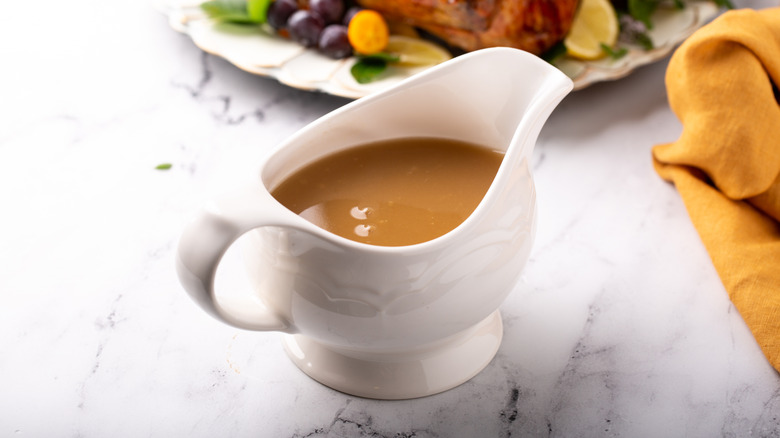Jazz Up The Flavor Of Store-Bought Gravy With One Boozy Ingredient
While store-bought gravy may be a great time saver, it often lacks flavor and depth. It's a difficult choice, convenience over excellence, but you may not have to compromise. With just a bit of medium to high-proof liquor, you can make something truly special.
Once the alcohol has evaporated away, booze becomes a transformative cooking ingredient. It alone has a great depth of flavor, so even small amounts can impart that taste quickly. While the gravy heats in the pot, add a tablespoon or two of wine or liquor. This gives the alcohol plenty of time to disperse throughout the pot while the flavorful compounds of the booze intermingle with the gravy's other ingredients. While no amount of cooking actually burns off 100% of alcohol, using a larger pot increases the surface area of the liquid, meaning you need to spend less time simmering your gravy.
Discussions about what kind of alcohol you should add to gravy are varied and sometimes heated. Diehard enthusiasts of steak au poivre may insist that cognac is the only possible choice, while others may claim that bourbon adds a bit of sweetness to the sharp, peppery sauce. Whatever you choose, a good rule of thumb is to match the colors of the booze and gravy.
What types of alcohol to add to gravies
Matching booze and gravy colors is not a firm rule, but, as a general guideline, it keeps you from sabotaging your meal. While red wine in a white sausage gravy may turn it into a gray mess of conflicting flavors, it elevates au jus by uplifting the flavors of vegetables and meats. If you're ever conflicted about what gravies and boozy ingredients to pair, try tasting both before combining and adjusting as needed.
Milk-based store-bought gravies absolutely love dry white wine. Light and a little fruity, just a couple of ounces are all you need to bring out its dairy and salt. With these gravies, however, we encounter a limitation to the color-matching rule previously mentioned. If the gravy has a lot of meat or mushrooms, bourbon quickly becomes a strong contender for enhancing flavor. Like white wine, it's a touch sweet, but its earthier flavor profile combines deliciously with heartier, meatier tastes. If you cook with whiskey, remember to always skip the top shelf as the differences between a cheap bottle and one that costs you over $500 are negligible.
Thinner, meat juice gravies like store-bought au jus or red-eye gravy appreciate full-bodied red wines, brandy, and cognac. You'll need to be careful and not add too much or else you'll make the liquid too thin, but you can always simmer them for longer to reduce. This is also true of brown "homestyle" gravies, though you won't need to worry about thinning them out quite as much.


